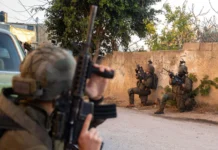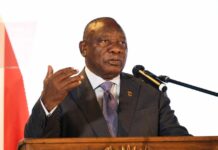Remember the agreement with Lebanon that Israel signed less than 18 months ago? An agreement we were promised would bring quiet and security along the northern border?
Under the current volatile security conditions along the border with Lebanon, those bombastic promises would be funny if we weren’t on the losing side of the agreement. As someone whose husband has been posted at Har Dov in the far north for over four months, I hear first-hand accounts of the daily routine of Hezbollah firing mortar shells and antitank missiles into Israeli territory. While a full-scale war has not yet broken out, it’s clear things cannot carry on the way they are.
The agreement in question was ratified within a brief time frame. Two drones sent by Hezbollah towards the Karish offshore gas field were enough to cause the Israeli security chiefs to panic. Amid another election campaign, the interim government headed by Yair Lapid settled the longstanding, fundamental dispute over the Israel-Lebanon maritime border within a few weeks by accepting the Lebanese position nearly in its entirety.
The Jerusalem-based Kohelet Policy Forum petitioned the High Court of Justice to enforce the provisions of the Basic Law: Referendum, according to which any concession of Israeli territory must be formalized by a referendum or by the ratification of 80 Knesset members, because the agreement included giving up Israeli territory. Other organizations also challenged the agreement in the High Court, mainly on the grounds that it should not be made by an interim government.
In response, the security chiefs dug in their heels and intimidated the court by claiming that the agreement was both urgent and vital to the State of Israel’s security. The petitions were heard within a few weeks and rejected one and all after a single day of hearings.
The reasoning for the rejection, delivered two months later, exhibits the court’s virtuoso effort to whitewash the impropriety of signing the agreement without a referendum. The court’s reasoning is alarming; taken seriously, we may one day discover that Haifa Bay can also be granted to another party without such a move being considered a territorial concession.
Today, it is clear that not only did the agreement fail to buy quiet from the Hezbollah terrorist organization, it had the opposite effect—it whetted Hezbollah’s appetite. One could claim that such a development could not have been foreseen, but that is precisely what the referendum law is for—to open the agreement to public discussion.
Before signing a sensitive agreement, it should be opened to discussion, with the array of considerations laid out and the different opinions of the Israeli public heard. Obviously, there were those who warned against the agreement, but they were simply ignored (or accused of acting recklessly). Yet, when such a significant move regarding one of Israel’s primary enemies is being considered, the bare minimum requirement is to hold a meaningful public discussion.
As one of the participants in the legal proceedings, I witnessed many important details emerging only during our frenzied preparations. On the morning of the hearing, for instance, we discovered that there is disagreement over how to calculate territorial waters and continental shelves, with one method clearly supporting our position.
Time constraints barred us from sufficiently developing this argument, which was consequently not properly considered. If we had had the opportunity to thoroughly review the agreement, other significant issues would surely have arisen.
This is substantially what public discussion is all about—providing the opportunity to inquire, review, and hear others. The details of the agreement were known primarily to a group of people who all think alike and have the same considerations. What generates “groupthink” more than a closed room in which the same people say the same things?
(The deal drew a border between the two countries’ exclusive economic zones (EEZs) based on a boundary known as Line 23, and awarded a disputed area of around 840 square kilometers (324 square miles) to Lebanon, while recognizing Israel’s claim to the Karish gas field and to royalties from the section of the Qana field that extends into the Jewish state’s EEZ.)
The paradigm regarding the Lebanese border is collapsing, just as the southern border did. Every day, the idea that concessions bring peace blows up in the soldiers’ faces (pun intended).
The idea that the concession of natural gas fields worth billions of shekels will lead the enemy to lay down its arms and focus on promoting its people’s interests has been proven both false and a signal of weakness. Even if there was, or is, room to argue for the effort to compromise with Hezbollah, we should not avoid public discussion of all opinions and positions. The Israeli public must hear, consider, and form its opinion.
In hindsight, we all know to tut-tut about the ideological prism that collapsed in the south; let’s change the paradigm about the north as well, before it too, blows up in our faces.
Efrat Saad Suna is a lawyer in the Kohelet Policy Forum’s litigation department.
Originally published by Israel Hayom.


























